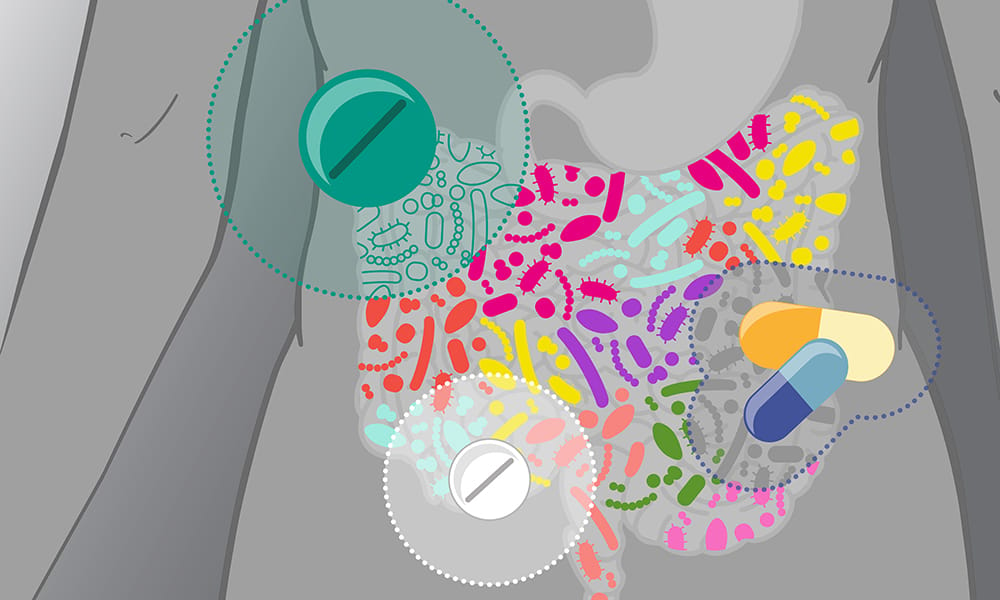- Dr Karan's Weekly Dose
- Posts
- The Perfect Prenatal Vitamin, Gut Harming Meds & Life Truths
The Perfect Prenatal Vitamin, Gut Harming Meds & Life Truths
The Weekly Dose - Episode 168
How We Chose the “Ideal” Prenatal for My Wife
…and it was way more confusing than it should be!

Choosing a prenatal for my wife has been one of the most unexpectedly confusing parts of pregnancy so far. We’re both doctors… and still we found ourselves going “Why is this so complicated? Why does everything contradict? And why are these capsules the size of a small asteroid?!”
And ultimately we landed on the philosophy… a prenatal is not a replacement for food… it’s an adjunct to a solid diet (Not a magic shield or a “cover-all”)
Just a safety net in a phase of life where the demands on the body increase faster than most people can realistically eat.
So here’s what we actually ended up doing and the thought process behind it:
1. Food first, always
Both of us agree: you can’t supplement your way out of a fundamentally poor diet.
Our baseline was built on:
whole grains
fruit and veg
legumes
nuts and seeds
oily fish or algae-based omega-3 (fwiw my wife doesn’t eat fish)
enough total calories to support pregnancy
Then we used supplements to “fill the predictable gaps”, not replace the fundamentals.
2. The nutritional pillars we prioritised
We focused on nutritional pillars pregnant bodies actually need more of:
Protein
Aiming for ≥1.2 g/kg/day; evidence-based, supports fetal growth, maternal muscle retention, and stabilises blood sugar.
Fiber
Pregnancy slows gut motility, constipation ramps up, and the microbiome shifts dramatically. My wife takes LOAM because it’s pregnancy-safe and provides a diverse range of prebiotic fibres a genuinely helpful buffer against pregnancy-related gut chaos.
Healthy fats & DHA/EPA
DHA/EPA is crucial for fetal brain and eye development… but most prenatals under-dose it because including full-dose DHA/EPA requires giant capsules (or multiple capsules). So we added a separate algal omega-3 supplement.
Choline
90–95% of women don’t hit the recommended amount. It’s essential for neural tube development, brain development, and methylation. Most prenatals provide ~50–150 mg. The evidence points closer to 450–550 mg/day. So we added a separate choline supplement.
Iron, folic acid/folate, iodine, B12, vitamin D, K2, magnesium
Found in good prenatals but highly variable in dose and form.
3. Why she’s taking 3 separate supplements instead of 1
Because realistically… no single prenatal can fit all of this into one capsule without violating the laws of physics.
So we ended up with:
A food-first diet + a high-quality prenatal multivitamin + a separate omega-3 + separate choline
Yes, it’s more effort but we both felt pregnancy is one of the few phases of life where the return on investment is massive.
4. And the most important part…
Always, always run your supplement plan past your midwife or OB-GYN.
Every pregnancy is unique. Conditions like hyperemesis, anaemia, thyroid problems, vegan diets, or twins require individual adjustments.
But here’s one thing I’ve noticed… if you’re worried about “doing enough,” you’re probably already doing a good job.
The parents who care usually overthink and that’s far better than underthinking.
We’re learning as we go and I suspect that will be the theme of parenthood too.
How Medications Shape Your Microbiome

A massive study of 2,509 adults in Estonia found that 42% of common drugs left measurable changes in the microbiome more than a year after people stopped taking them. Not just antibiotics… but everyday medications like:
Beta-blockers
Antidepressants
Benzodiazepines
Proton pump inhibitors (PPIs) for reflux
Steroids
Metformin
These aren’t inherently “bad”... they’re lifesaving for millions but the new research shows something we’ve underestimated: medications don’t just affect human cells… they interact with our microbes too.
And microbes don’t forget easily.
What the study actually showed
Researchers tracked five years of prescription data and compared it to stool samples. When someone had ever taken a medication (even 3–4 years earlier) their gut bacteria still carried the “fingerprint” of that drug.
Drugs that had the strongest long-term effects
Surprisingly, the “big hitters” weren’t just antibiotics:
Benzodiazepines (e.g., Xanax, Valium): gut impact similar to broad-spectrum antibiotics
Beta-blockers
SSRIs and other antidepressants
PPIs (omeprazole, pantoprazole): increased oral bacteria in the gut due to reduced stomach acid
Steroids
Metformin and diabetes meds
When people started these medications, their gut profile shifted and when they stopped them, the microbiome shifted again… in the opposite direction.
That’s as close to causal evidence as microbiome research gets right now.
Why this is key for real people (not just researchers)
1. Gut diversity drops with multiple medications
People taking several prescriptions had lower bacterial richness; fewer species overall.
Low diversity is linked to:
poorer metabolic health
higher inflammation
reduced resilience after illness
higher infection risk
2. Antibiotics have long aftershocks
People who had used antibiotics up to five years earlier still had reduced microbiome diversity. Time alone didn’t fully restore it.
3. Your doctor might think your gut problem is “disease”… but it might be “drug history”
The study showed that when you properly adjust for medication history, many disease-microbiome links disappear, meaning: sometimes the gut changes blamed on disease are actually from the drugs used to treat it.
What you can do
This isn’t a message to stop medications…never discontinue a medication without medical guidance. But it is a reminder that many people stay on certain drugs far longer than necessary; especially PPIs, SSRIs, and benzodiazepines.
1. Review long-term medications yearly: Ask your doctor or specialist:
“Do I still need this? Is there a tapering plan? Are there alternatives?”
A lot of people stay on PPIs for years when their original reflux trigger has resolved.
2. Ask if lifestyle interventions can replace or reduce the dose
Especially for:
reflux
insomnia
mild anxiety
hypertension
type 2 diabetes
Small changes can sometimes reduce the need for long-term meds (never abruptly, always monitored).
3. Protect your microbiome while on necessary meds
These are simple, daily levers:
Eat more coloured plants: polyphenols feed beneficial bacteria.
Hit 30g+ of fiber/day: especially soluble slow-fermenting fibers.
Eat fermented foods (yoghurt, kefir, kimchi, sauerkraut).
Prioritise sleep and stress reduction: both improve gut resilience.
Strength training: improves metabolic flexibility and insulin sensitivity.
4. After antibiotics:
Add fermented foods
Focus on soluble fibres
Reduce ultra-processed food for 4–6 weeks: Your microbiome rebounds faster with the right fuel.
P.S. If life gets chaotic (travel, stress, weird schedules), the biggest lever is consistent dietary patterns, not pills. I personally take LOAM every day; our 6-in-1 prebiotic blend…to ensure I’m feeding my microbiome even on messy days. Think of it as “gut insurance,” not a replacement for whole foods.
Quick interlude: If you think The Weekly Dose is cool 😎, share this newsletter on socials, mention it in your newsletter, and/or hit forward to your health-curious friends, family, and that one fiendish coworker who loves learning about health stuff.
Reminder: This newsletter is free, always will be and I send it out every Sunday to give you in-depth insights into the health topics!
Things I Wish I Knew Before My 30s

1. Tell (or show) the people you love that you love them; every day.
If I could go back and whisper one message into my younger self’s skull, it would be this: love is finite in time but infinite in impact. Tell your partner you love them before you fall asleep. Even on the days you’re tired. Even on the days you’re annoyed. Especially on the days you’re annoyed. Tell your parents you love them or show it… do something.
Neuroscience says the last emotional signal your brain receives before sleep shapes how memories are consolidated overnight. When you end the day with affection, the brain literally files that person into the “safe & meaningful” folder.
And one day… and this is the part no one warns you about… you will look to the other side of the bed or across a quiet room and realise someone you love isn’t there anymore. A move, a breakup, a loss, life shifting in the ways life always does. You will ache for one more “goodnight, I love you.” You won’t care who started the argument or whether the dishwasher was emptied. You’ll just care that you missed a chance to say something simple and true.
2. Fix small things early as they rarely stay small
I wish I’d learned earlier that tiny problems are never just tiny problems. Relationships, homes, friendships, health… all follow the same rule.
A loose roof tile becomes a leak… a sore knee becomes an injury, a drifting friendship becomes silence and a small misunderstanding becomes a grudge with its own gravity.
I’ve lost friendships I shouldn’t have lost because I assumed they would “survive the distance.” I let messages go unanswered, schedules get crowded, years get busy. The truth is anything you don’t actively tend to will eventually decay. Entropy applies to emotional life too.
We humans mistakenly believe things will stay the same without input. But the brain adapts to what is present and forgets what is absent. If you don’t water the connection, the neural pathway weakens.
Repair the small cracks early… send the text, apologise even when it feels awkward… go for the check-up you’ve been avoiding.
Nothing collapses out of nowhere… it happens gradually, then suddenly.
3. End arguments fast because no one has ever fought their way to happiness
Let me let you in on a dark little truth of adulthood: you never win an argument, you only lose time, peace and cortical bandwidth.
Prolonged conflict keeps your brain in a dopaminergic-cortisol tug-of-war. Your threat system stays lit, your prefrontal cortex (the rational part) goes offline, and your emotional immune system gets exhausted. You feel righteous in the moment and hollow afterwards.
No one has ever said, “I’m so glad we dragged that fight out for three days.” But everyone has said, “I wish we’d ended that sooner.”
Resolve conflict quickly. Walk away for ten minutes, not ten hours. Protect your mental energy like the scarce resource it is
Life gives you a limited number of days so don’t waste them replaying the same argument in your head like a broken cassette.
👋 Who are you again? I’m Karan Rajan - a doctor and curious explorer of all things health and wellness. I host the Dr Karan Explores Podcast and have written two books "This Book May Save Your Life" and "This Is Vital Information" (you can pre-order it now!) and have just founded a microbiome company, LOAM Science to create the best fiber product in the world!
Every Sunday, I share 3 interesting things about health, life and science to make your life easier, healthier and happier. (Disclaimer: I’m more your friend with health benefits. None of this is medical advice.)
And oh, you if also feel strongly about some health things or just want to say hi? Hit reply... I’d love to hear it and hear from you! (yes I read every reply!!!)
Oh and before you wiggle away until next Sunday… here’s the subscribe link to my newsletter if you fancied sharing it with a friend, family member or your arch nemesis!
